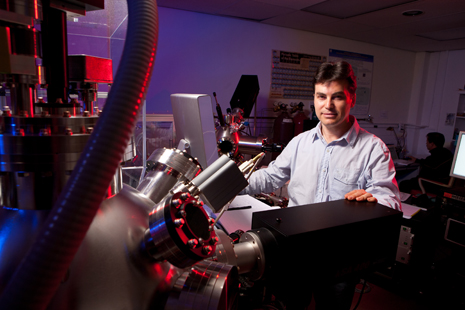Crystallizing the Future of Oxide Materials
FAYETTEVILLE, Ark. – A University of Arkansas physicist and his colleagues have examined the challenges facing scientists building the next generation of materials and innovative electronic devices and identified opportunities for taking the rational material design in new directions.
Jak Chakhalian of the University of Arkansas, A.J. Millis of Columbia University and J. Rondinelli of Drexel University present their ideas in the current issue of Nature.
“Where you see issues, there are opportunities,” Chakhalian said.
The researchers focus on complex oxide interfaces with strongly correlated electrons, which are artificially created structures involving materials called transition metal oxides. Oxide interfaces have the potential to revolutionize materials and devices based on the way that semiconductors once did, but researchers find themselves hampered by several obstacles.
First, no one has developed a comprehensive theory of why oxide interfaces behave as they do, which means that scientists cannot predict or often even explain the materials’ properties. Second, scientists face challenges in synthesizing these complex materials with atomic precision. Synthesizing involves taking several chemical elements balanced very precisely and combining them into intricate geometrical arrangements. On top of this, to create interfaces, scientists must grow these very dissimilar materials together.
While these challenges may seem intimidating, Chakhalian and his colleagues see two opportunities. The first is to grow materials in unusual directions. Chakhalian has already demonstrated that an oxide interface grown along the diagonal of a cube will crystalize into triangular and hexagonal atomic patterns, while the same material grown on a conventional “horizontal” surface will have a common cubic pattern.
“When grown along the diagonal, from the mechanical, electronic and magnetic properties point of view it becomes a new, exotic material,” he said. By forcing materials to grow in directions that they would usually resist in nature, Chakhalian suggests a way to find these novel exotic materials.
The second opportunity involves creating interfaces between oxide materials and materials where oxygen is replaced by another element, which leads to entirely new materials with novel electronic properties. For instance, nickel oxide is an insulator but nickel sulfide is metallic. By alternating an oxide-based layer with a non-oxide based layer, scientists propose creating interfaces with important properties for, among other things, energy savings and water purification.
“If you want to talk about the next nanoelectronics revolution or real solutions to the energy problem, these are some of the groundbreaking directions we propose to take,” Chakhalian said.
Chakhalian is the Charles and Clydene Scharlau Professor of Physics in the J. William Fulbright College of Arts and Sciences.
Topics
Contacts
Jak Chakhalian, professor, physics
J. William Fulbright College of Arts and Sciences
479-575-4313,
jchakhal@uark.edu
Melissa Blouin, director of science and research communication
University Relations
479-575-3033,
blouin@uark.edu
Headlines
U of A Bands to Hold Three Nights of Concerts
The Symphonic Band, the Wind Symphony, the 4 O'Clock and 5 O'Clock Bands and the Wind Ensemble will perform April 21-23 at the Faulkner Performing Arts Center on the U of A campus.
Honors College to Host 'Best in Show' Dog Celebration
The campus and community are invited to celebrate our furry friends with popsicles, water and dog treats from 3-4 p.m. Thursday, April 25, in the Gearhart Courtyard.
New Parasite Affecting Canadian Partridges Named for Arkansas Poultry Scientist
A long-time colleague in Canada gave a newly found parasite the scientific name Eimeria hargisi in honor of U of A poultry science researcher Billy Hargis.
U of A School of Law Student Selected for Ms. J.D. Leadership Academy Intensive
Tristan Branstetter-Thomas, a second-year law student, was one of 30 students from across the country chosen to participate in the leadership academy at the Northwestern Pritzker School of Law in Chicago.
Needy Honored as Distinguished Alumna of University of Pittsburgh Engineering College
College of Engineering Dean Kim Needy was among seven alumni of the University of Pittsburgh Swanson School of Engineering honored in April as part of the 2024 Class of Distinguished Alumni.





